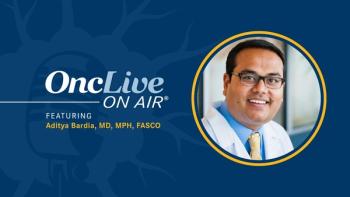
Future of CDK4/6 Inhibition in HR+ Breast Cancer
Transcript:
Stephen Johnston, MA, PhD, FRCP: At the moment, we don’t know whether these drugs are going to make a major impact in early breast cancer for patients who have surgery, and we’re aiming to cure them of their disease. A number of trials are ongoing with these agents as we speak. With palbociclib, the PALLAS trial is well through its recruitment phase. With abemaciclib, the monarchE study is looking at patients at higher risk who have 4 or more positive nodes; or if 1 to 3 positive nodes, a large or grade 3 tumor; or a tumor with a high-proliferation Ki 67 index. These are patients in the early breast cancer setting who we know have only an 80% chance of being free of disease at 5 years.
In other words, 20% of those patents will relapse despite the best current treatment. The monarchE trial, which will recruit 4 and a half thousand patients, is going to address a question in these high-risk patients: Will they benefit from the addition of abemaciclib, which will be given for 2 years, in addition to the endocrine therapy compared with endocrine therapy alone? The trial is well under way in recruitment, and we expect to get data that will be really important in clinical practice, to see whether these agents can cure more breast cancer in the early, operable setting. But the data won’t be available for a few years yet.
Matthew P. Goetz, MD: As we think about tumors that express both the estrogen receptor as well as HER2, we know that cyclin D1 is certainly a critical factor that accepts input from the upstream signaling pathways. There are actually data that go back well over 10 years demonstrating that, preclinically, in ER [estrogen receptor]—positive, HER2-positive breast cancer, cyclin D1 is an important target that when knocked down, we see profound antitumor effects.
Therefore, it really does make sense if we think about targeting the CDK4/6 cyclin D access, we would target it not only with a CDK4/6 inhibitor but with a drug that targets the estrogen receptor. We would also target the HER2 pathway. And certainly, there are quite excellent preclinical data demonstrating this approach. But there are also some very exciting clinical data that have been observed in patients who have ER-positive, HER2-positive disease that has been quite refractory. We’ve seen responses to single-agent abemaciclib. But there are now data generated where we’ve combined CDK4/6 inhibitors with trastuzumab and pertuzumab along with endocrine therapy, and we’re seeing quite robust responses.
There are a number of clinical trials that are ongoing in the metastatic setting. There’s the PATINA trial, which is looking at the role of palbociclib in ER-positive, HER-positive breast cancer. There’s the study with abemaciclib in combination with fulvestrant for ER-positive, HER2-positive breast cancer. I think we’re going to be getting some data very soon that will allow us further insight into the role of targeting the CDK4/6 cyclin D1 pathway in ER-positive, HER2-positive breast cancer.
Joyce A. O’Shaughnessy, MD: Can we even do better? Can we think about triplet therapy in the metastatic setting? With an endocrine agent plus a CDK4/6 inhibitor now having a median progression-free survival first-line of 2 or more years, those are the best data we have across all of metastatic breast cancer. What can we add? What are the mechanisms of resistance that come up? What can we add to that to do even better? There are data now with the triplets of adding an mTOR [mammalian target of rapamycin] inhibitor, everolimus, to CDK4/6 and endocrine therapy. There are some good safety data and some evidence of benefits. That’s actually being looked at in patients who are progressing on a CDK4/6 inhibitor, to keep them going and add in the mTOR inhibitor.
But even more interesting to me is using it up front because we know the PI3-kinase pathway can be a mechanism of escape to CDK4/6 inhibitors. It’s the same with the PI3-kinase inhibitors; add them up front as well to CDK4/6 and endocrine therapy. Very intriguing are the checkpoint inhibitors. As single agents late line, there’s a low level of activity with checkpoint inhibitors, the anti—PD-L1 agents, particularly pembrolizumab, atezolizumab, and durvalumab.
There is some benefit in ER-positive disease, but we really need to get that much earlier, and combinations are going to very important. There’s a very important paper by Goel et al that looked at CDK4/6 inhibitors and found they inhibit T-regulatory cells, which could inhibit the function of CD8 and cytolytic T cells. The CDK4/6 inhibitors increase endogenous retroviruses, and it looks as though there is cytoplasmic DNA from activation of these endogenous retroviruses. That actually increases a type 1 or type 3 interferon response, and it tracks in cytolytic CD8 cells.
The CDK4/6 inhibitors have a couple of different mechanisms of action where they can make the breast cancers more immunogenic. And so there’s a lot of interest and studies ongoing combining the checkpoint inhibitors with CDK4/6 inhibitors. A study that Sara Hurvitz did of preoperative abemaciclib with anastrozole actually showed that some patients went from being a desert with regard to tumor-infiltrating lymphocytes to having, after 16 weeks or so of abemaciclib, substantial infiltration of tumor-infiltrating lymphocytes. It was quite interesting, and that’s what the Goel paper would suggest. That’s a very, very promising area.
There are other agents in phase III trials in ER-positive disease, such as the HDAC [histone deacetylase] inhibitor entinostat. If that is a positive trial, that will be another candidate, for example. We probably need to look at various triplet therapies to see what’s going to make the most sense to try to move into the first-line setting and get up to 3 or 4 years of median progression-free survival.
Transcript Edited for Clarity

































